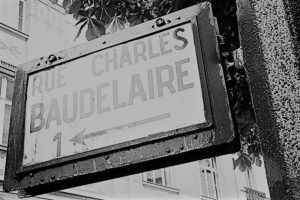With the #MeToo and #balancetonporc campaigns hitting the press in recent times, we might ask what lessons history has to teach us. Should we be wary of authors of high profile classics? Did Baudelaire have questionable attitudes towards women?
In a series of blog posts in English and French, we explore the question “Should feminists read Baudelaire?” Baudelaire himself seems to suggest we shouldn’t: «Ce n’est pas pour mes femmes, mes filles ou mes sœurs que ce livre a été écrit» (“This book was not written for my women, my daughters, or my sisters”). But is this really fair?
Series | BAUDELAIRE AND FEMINISM
Last month, we published the first in our ‘Baudelaire and Feminism’ blog series, inviting international Baudelaire specialists to respond to the question ‘Should feminists read Baudelaire?’. Following on from Prof. Rosemary Lloyd’s post, our next contributor is Dr Maria Scott, an Irish researcher now based at the University of Exeter, UK. Known for the interesting angles she takes on works by nineteenth-century French authors, Dr Scott published Baudelaire’s ‘Le Spleen de Paris’: Shifting Perspectives (Ashgate, 2005), for which she was awarded the prestigious R. H. Gapper Book Prize for the best monograph published by a scholar working in the field of French studies and based in the UK or Ireland. More recently, Dr Scott has co-edited an important new contribution to the study of Baudelaire with Prof. Alexandra Wettlaufer, called Baudelaire and Other People and published in 2018 in L’Esprit Créateur, exploring what it means to live in permanent proximity to other people.
Should feminists read Baudelaire? I don’t believe there’s anything that feminists shouldn’t read. And I’d argue that anyone with a beating heart and a functioning brain is a feminist, even if they haven’t realized it yet, so I suppose the question is really whether anyone at all should read Baudelaire. Here are the three main reasons why Baudelaire should, in my view, continue to be read by people with working hearts and brains, despite the apparent misogyny (and indeed misanthropy) of some of his work:
(1) There’s a painting by Paul Cézanne, called L’Éternel féminin (1877), that shows a crowd of men, including a bishop and an artist, admiring a naked, reclining woman whose eyes have been gouged out. It shows how closely the idealization of women can be linked to the hatred of women.
Baudelaire’s writing does this too. In many of Baudelaire’s verse and prose poems, he offers readings of women that show the dubious underpinnings of admiration. The speaker in the poem ‘À une Madone’ talks about all the sadistic things he would do to his idol in order to prove his adoration of her. The prose poem ‘Laquelle est la vraie?’ suggests very strongly that a woman’s physical reality has to be brutally suppressed in order to protect the abstracted, ideal woman. The prose poem ‘La Belle Dorothée’ invites readers to admire a beautiful, vacuous, narcissistic woman while implicitly showing that this woman is very far from vacuous and narcissistic; the end of the text reveals that she is in fact working as a prostitute to buy her younger sister out of slavery, but the narrator does not explicitly revisit his initial reading of her happiness and coquetry. I am always surprised by the number of analyses of this text that neglect the fact that Dorothée is a prostitute, either not mentioning it at all or pushing it into the margins, as if it didn’t change everything about how we interpret her blissfully happy smile, as she parades in a tight silk dress under an intolerably hot sun. Texts like these remind us, just as Simone de Beauvoir’s Le Deuxième Sexe reminds us, that we need to be very suspicious of efforts to idealize women, however benign these efforts may seem at first glance.
(2) Baudelaire is slippery. Whatever the red-wine drinking, cat-loving man might have meant at the time he was writing (assuming he knew what he meant), his verse and prose poems can be understood to imply the opposite of what they seem to say. Nobody can say, for once and for all, what these texts mean, least of all the man himself, who is long dead and who never cared to explain his meanings in much detail anyway. For that reason, I am entirely capable, for example, of reading a prose poem like ‘La Femme sauvage’, where a woman is threatened with defenestration, or a prose poem like ‘Les Yeux des pauvres’, where an arguably highly obtuse narrator mounts a scathing attack on his female companion for her obtuseness, as blistering, oblique critiques of misogyny at its most ridiculous.
(3) Baudelaire’s poetry has lent itself to some very insightful readings, over the years, by critics who would identify as feminist. However, Baudelaire’s poetry has also been subjected to readings that are insufficiently informed by feminist thinking. These tend not to be very insightful readings of his work, because they typically take the verse and prose poems at face value, not interrogating their contradictions and inconsistencies. The only way to counter these readings is to offer more lucid and ultimately more persuasive interpretations. Feminists have a habit of looking beyond whatever kind of man we might assume Baudelaire to have been, to the evidence of the texts themselves. So yes—rigorous thinkers, who by definition acknowledge the fundamental equality of the sexes, should continue to read Baudelaire because we need lucid readings of his work. Baudelaire’s verse and prose poetry remind us how powerful and political a practice reading can be.
Maria Scott




